he/they | creator of many an awful au. new art i don't know when you just have to wait and see
Don't wanna be here? Send us removal request.
Text

Hostias et preces tibi, Domine, laudis offerimus
15 notes
·
View notes
Text


there is this comfort in thinking perfume spilled in your bag rather than to entertain the idea that you meant something by the bleeding ink
15 notes
·
View notes
Text


something for my czech brothers, something for everyone
#hansry#jadřich#fannigism#i know they don't look too good i'm still working on that#anyways do you... see my vision? it's... well i don't know what i'm cooking here but it doesn't look too good
23 notes
·
View notes
Text
ORPHEUS AS A BLACKSMITH
[5400 words. Partially canon/history accurate. Post-games AU. Violence, angst, hurt/comfort. I might touch up some things.]
“Any work going around here?” He asks as soon as the innkeeper pockets his hard-earned coins.
“None whatsoever,” the man shrugs. “You can try talking some sense to Old man Johannes, but that is a futile effort, so be warned. If he buys you a drink, that’s a reward enough.”
“Old man Johannes?” Henry quirks a brow.
“Aye,” the innkeeper nods. “He lives at the end of the village. Recently he’s been… annoying, to say the least. Keeps wailing deep into the night. Scared off some of well-paying travelers, too.”
“And you want me to do what about it? I’m not an exorcist.”
He huffs a dry laugh. “No, I imagine you are not. It was just a thought, so that we don’t stand here idly and in quiet. You asked, I answered.”
Henry looks around. It’s a small hamlet, not far from Prague, recently having transferred hands from the church to the village proper. No work here, well, apart from this weird thing with “Old man Johannes”, but perhaps in Prague he’ll have more luck. He’s weary, though, so hanging around for a day in a place filled with peace and, apart from the reported inconsolable Old man Johannes, quiet – so far it’s been quiet, at least, but come night, there’s things bound to happen – will do him good ahead of the bustle and rustle of the big city.
“Thanks anyways,” Henry parts ways with the innkeeper.
He tends to his horse, checks up on his supplies. He can’t deny he’s intrigued by the Old man Johannes. His curiosity gets the better of him, so he asks around. Most folks only know of his nightly weeping, saying he cries himself to sleep and that it takes painfully long, too.
“Like the devil’s roasting him on a spit over the bonfires of Hell itself,” one man tells him. It’s difficult to say whether or not he’s exaggerating.
Old man Johannes doesn’t have a job and comes and goes. There are days when he’s holed up in his house and days when he disappears without a trace, only to come back in the evening to the tavern. Some say he’s good company by a pitcher of ale. At any rate, Henry is directed to a stone cottage at the edge of the village, by a road that should lead to Prague.
The house is a little run down, Henry has to admit. The roof could definitely use some work. The grass surrounding it is overgrown, and there are no animals, in fact no sign that anyone would be living here. The makeshift fence’s gate is propped open, so Henry wanders into the property, yet vigilant for a sign that someone is about to hurl at him with a pitchfork and cuss him out. Nobody comes. A beaten path leads to a distant outhouse shared with the nearby properties. There is nothing unusual or exceptional about Old man Johannes’ home.
Henry knocks on the door, and waits for an answer that doesn’t come. So he tries again, and when nobody answers still, he checks the perimeter, wary of nosy neighbors. They must be out in the fields; seeing no-one, and no-one seeing him, Henry tries his luck by pushing against the dry, gray wood of the door. To his utter surprise, the house welcomes him – light from the outside pools into the dim, dusty room.
It is cold and dark inside. The house smells like an old castle, damp stone and aged wood. There’s a low wooden tub set against the wall. A small room to its right is a pantry, albeit quite poorly stocked: a piece of cured meat hangs from one of the shelves, some dried grains have spilled from a sack knocked over, root vegetables whose best days are over, a chipped, emptied pitcher. Henry closes the door to the pantry behind him and instead ventures into the main room whose door is wide open and inviting him inside. Old man Johannes is a right fool, Henry thinks.
What looked outside as a miserable peasant dwelling hides inside no modest man’s abode. Old man Johannes has wooden floors and a large, painted fireplace, a proper bed – and a wide one at that. He is no peasant, that is for sure.
Henry approaches the bed first. Sturdy, crafted wood holds enough space for two people to comfortably rest in clean sheets. But only one side appears to be slept in. The other is neatly made, clearly it’s been a while since anyone occupied it. From underneath its pillow peeks out a book, half-heartedly shoved there. Henry reaches out to look at it, finds a withered, leather-bound volume. Breath hitches in his throat. Before he can inspect it closer, a creak of the wood startles him. He abandons the book, and moves onto the rest of the furnishing.
Beside the bed is a table, also set for two. One chair is pulled away, probably by Johannes, for it too looks more worn compared to its sibling. There is a fine, embroidered tablecloth stretched over the surface, a bowl of unfinished gruel of sorts in front of Old man Johannes’ seat. An empty bowl sits before the empty chair, set for someone who won’t be dining tonight, dust collecting at its naked bottom. A glass chalice suffering the same fate; Johannes’ cup stained by remains of wine. Is Johannes waiting for someone? Does he keep any company at all in his home, occasional, at least? Is he mourning a wife, a child, in this eerie, frozen world he has built for himself? In the middle of the table sits a vase with the remains of a bouquet. Withered flowers: sage, dandelion, poppy… a lone, drought-blackened rose, and some forget-me-nots. Like Johannes’ heart? Henry begins to muse almost poetically. Old man Johannes might be an old, bitter wretch, after all. Let’s not assign to him romantic visuals of piety and faithful suffering, not yet. These flowers grow all over Bohemia, and plenty of people pick up a stem or two to bring home after a long day. Johannes might’ve picked them himself, sure, to add color to his gray existence within these sad walls. Or he might’ve been given them. By whom, if nobody really talks to him, remains a mystery.
Henry looks around the room. The fireplace is cold, but in the pot set in it sits fresh water. Johannes must’ve been home recently, even if he comes and goes at odd hours. Why, he might come back any minute. Better not to linger.
Henry’s attention returns to the bed. A singular chest sits at its foot – Henry won’t steal from it, not yet, at least. The fact that it, too, is left unlocked, frustrates Henry. The chest is filled to the brim with clothing of undoubtedly finer variety. Perhaps Old man Johannes is an opportunistic trader? Henry digs between the clothes, inspecting them. It turns out that there aren’t nearly enough of them to fill out the chest on their own. Their height is inflated by pieces of armor, disassembled and sandwiched amongst hoses, shirts, underwear… tarnished, wrecked plates of hard steel, though of fine craftsmanship. Henry stills. Old man Johannes is a mercenary? An erstwhile bandit? Or is he storing loot found on the site… of an unfortunate accident? It doesn’t seem he intends to sell the armor. And then, at the bottom of the chest, wrapped in a thick, woolen fabric, lies a sword that’s seen better days, collecting rust. Old man Johannes, what secrets are you hiding? Henry jumps to conclusions that cloud his judgement.
The book under the pillow draws Henry’s attention once again, as though promising him answers to his questions. He abandons the stash, and returns to the bed. The tome has been in kinder hands. Its cover is completely beaten, dented and worn, hanging onto its dear life. The pages are thin, similarly frayed by years and years of reading… or careless flipping through. It’s an illuminated book of hours, written in Latin. Did Old man Johannes steal it? Did he buy it? Did he receive it as a gift? Does he understand what is written in there? Henry flips through the pages as though looking for an explanation in the text, and finds himself at the book’s end. Its last page catches his attention with its inflexibility, preventing him from closing the book until he investigates. Upon closer inspection, it’s not one, but two sheets stuck together. Depressions in the parchment as though command him to look, and, well, Henry was never the one to turn down a challenge. He wedges the nail of his thumb between the pages to gently pry them apart. He is rewarded with a look at a beautiful, though faded illumination.
At first, the image is unclear, smudged and pale, its colors blotted by time. Focusing on it, a scene of two knights on horseback approaching faint walls of a city unravels. The inscription has since washed out, but the slightest undertone of pigment remains on their tunics: one wore yellow, the other quartered orange.
No little dread set onto Henry. One wears yellow, the other quartered orange. Their horses, also a little worse for the wear… one wearing a yellow caparison… the other… is gray.
Henry flips the book around. He was wrong – it wasn’t a dent on the front. Though the leather is dark, scratched and flaking, the shield he had mistaken for damage bears the two crossed branches of the lords of Leipa.
The room is too dark, too suffocating. It is screaming at him, berating him, ridiculing him. The ground quakes beneath his feet, and gruesome, dark scenes flash before his eyes. Henry mistakes the bead of sweat rolling down the side of his face for a raindrop, and his chest tightens, he grits his teeth, he sucks in air to cry out—
“there’s something very special I have for you,” Hans grinned.
“you’d like me to guess?”
“no, you’ll just have to be patient. I want it to commemorate our journey, which has barely started yet. We have plenty of time,” he said wistfully.
Where did this book come from? Why, after all these years, did it end up in his hands? Where is the man who received it when it was brand new?
He never found out just what that special thing for him Hans had. Henry shudders at the memory, and to ground himself, he presses the old volume to his heart, closing his eyes, forcing away the memories that crawl out of the depths of his mind and quicken his heart, make him feel cold, small and cowardly all over again. As panic subsides, he studies the book again… but it’s too painful. It reminds him too much of what he’s lost. He becomes angry with Old man Johannes – why does he have this book? Where the devil did he get it? He hadn’t intended to steal anything, but this… this is too valuable to leave in the hands of a wrong person. It might hurt Old man Johannes. Henry will explain it to him. He will not, must not, cannot leave this place without that book.
Though his hand tremors, he puts the tome back where he found it. Old man Johannes might know more, and he will be more willing to divulge his secrets when approached in goodwill.
He might give up the book whose contents are worthless to him. He might know of a burial mound Henry can go to.
Through the window a woman’s figure appears in the distance, clearly headed towards the house. Henry quickly clears out of the building, just in time to appear that he only recently arrived and is still just looking around.
“Are you searching for someone?” The young woman accuses him when she finds him loitering before the door.
“Aye, Old man Johannes. I was told he lives here,” Henry tells her.
She eyes him up and down. “Have you tried knocking?”
“Yes, but no-one’s answering.”
The young woman shrugs. “Bummer. Then he’s not here. I was just about to bring him his laundry, too.” And she rebalances the woven basket full of linen on her hip.
“You wouldn’t know where I could find him, would you?”
“Dunno. But he’s bound to turn up, sooner or later. Probably at the tavern, though.”
“They told me he goes there often, but I haven’t seen him there.”
“Why you looking for him?” the young woman asks.
Henry stalls. “I was led to believe he might… know something about a man I’m looking for.”
“Who you looking for?”
“An old friend,” the words are heavy on his tongue.
She frowns. “Old man Johannes is not the talkative, nor the… friendly type. I don’t think he’ll be able to help you. But hey, don’t say I didn’t warn you.”
“You said he goes to the tavern?”
“That he does,” she sighs. “To drink his money away.”
“He’s a drunk?”
She shakes her head. “Who isn’t, these days. Nay, I wouldn’t say he’s a drunk, in the usual sense. But this time of the year, when summer nears, he gets bad.”
“Bad? How so?”
“He says he’s haunted. That he’s trying to keep demons at bay. That he doesn’t want to remember.”
A history of thieving, perhaps? “Remember what, his debts?”
“Nay, he’s quick to pay for everything. Maybe too quick. He goes to Prague every now and then and comes back with a pocketful of coins. Spends them right away at the alehouse. Why, sometimes he comes home already drunk. What little he manages to save, he spends on food and soap. I used to do his laundry for free, but he slips me a groshen or five for my work.”
“You do his laundry, does that mean he’s ill? I heard he doesn’t work.”
“He does have something of a lame leg, walks a bit… unsteady, even when sober. But with the money he gets from Prague I doubt he will ever really need to work. I do his laundry… out of kindness, I think. He looks so sad and helpless. Most of the folk only talk to him at the alehouse… and only for as long as he keeps their pitchers full. When the money runs out, so does their attention. I wanted to show him he’s not… completely alone. Anyways it’s not like he couldn’t work.”
Henry frowns. “What do you mean?”
“Well… you didn’t hear it from me… but despite his bad leg he looks quite well. I don’t see a reason a man like him couldn’t do a bit of farm work, swing a garden hoe. At first I thought him an idler… but there is something else to him. It’s like he doesn’t know how to work. He’s handsome, too… or he would be, if he gained a little bit of weight and muscle… and smiled more. He just needs cheering up, and to stop drinking. Maybe that’s why they all started calling him Old man Johannes. He is called Johannes, but he’s not an old man. In fact he could be just slightly older than you.”
His heart starts, but there’s no reason to have hope yet. “And he doesn’t keep any friends, any company at all? Doesn’t have a wife or children?”
“Poor soul, he’s all by himself in this world. Breaks my heart just thinking about it.” She wipes at her eyes, even though she didn’t shed any tears. “He doesn’t go to the church, either, except on high holidays. A couple of years ago some people came by from far away by the looks of it, spent time with him. They were quick to leave, though. Nobody has visited him since.”
“Has he always lived here?”
“No. It’s maybe ten years since he’s come to the village? More or less. He had the house built right away, and hasn’t budged.”
“Where did he come from, then?”
“Some of the places ruined by the war… who knows. He looked harmless, so we just let him stay.”
Old man Johannes lived an empty though tranquil life, hid old armor in his house, kept a book he might as well have pried from cold, dead hands—a drunk and impaired. Henry can’t tell whether he hates or pities the man. And yet… and yet what were the chances? What if Johannes…
“His name really is Johannes?”
“Aye…?” she eyes him funny.
Johannes… Johannes with a taste for wine and an aversion to manual labor… Johannes with fine clothing in his chest and a pocketful of groschen… Johannes with old knight’s equipment… Johannes with the book of hours. Johannes who never married.
Henry turns his eyes to the clear summer sky and waits for his heart to stop hammering.
“I still don’t think Old man Johannes is the man you’re looking for. You have nothing in common,” the young woman interrupts his thoughts.
We might have more in common than you’d think, Henry ponders. “One last thing. You wouldn’t happen to know where I could find him at this here moment.”
“Maybe… but you must promise me you’re not here to break his neck.” She notes his armor, the long sword hanging by his side. Cutthroats still swarmed the country, and she had every right to protect the man. Even if she told Henry a lot as it is.
“i’m here to make amends,” Henry tells her.
She studies him, long and hard, and seeing his earnest, sad eyes, she gives in. “’Twas this morning I saw him go thataway,” she gestures vaguely in the direction Henry had come from, “Probably to pick flowers. Beyond the grove is a meadow. You’ll find him there, I’m certain. But please, be kind. He needs kindness.”
“And kindness I shall show him,” Henry tells her as he mounts his horse, then he’s off galloping in the direction she sent him to.
Will he be the same? Is it really him, or just one of the bastards that shuffled him of his mortal coil? Is it someone who found him battered and dead and kept his things, an impostor living off of the name of a gone man?
And it is him, if it truly could be him, was he really here all this time? How did he get here? Why was he hiding? Will he remember Henry? Or will he scorn him? Does he still love Henry the way Henry never stopped loving him?
He remembers the rain, most of all. It was rainy that day, and cold.
It was supposed to be a fun adventure. Hans came up to him one day with an offer impossible to say no to: that they, finally, after years of careful planning, see the Holy Land. Naturally there was nothing holy in Hans’ face as he said it – his eyes glinted with mischievous, contagious opportunity that captivated Henry time and time again. Just the two of them on a beautiful journey, what more could he ask for? Even if the world seemed uncertain, even if everything and everyone seemed to be against their odds, they stole away yet another slice for themselves. With the first thaw they mounted their horses and rode off.
Lulled by a sense of security, intoxicated by their freedom, living each day as if it were their last, living for each other. Barely were they out of sight when they seized the first opportunity to kiss and touch and profess undying love to one another. Day by day they drunk up each other’s presence.
It was the most blissful time of Henry’s life. Every day he woke up greeted by an armful of Hans. Every meal they shared out of one bowl. From every spring they offered each other fresh water to drink from their palms. Odes and sonnets could be written about their adventure. At night they huddled as close as their skin allowed them to. Wandering through endless grasslands, Hans would stop to pick flowers and then stick them into Henry’s hair. He became quite talented at weaving flower crowns as well, to bestow upon Henry’s head. They didn’t have to worry about watchful eyes, about treacherous companions, because this time it was just the two of them, and sometimes it felt as though the world around them wanted it, too.
The forest sprouted out before them like a warning finger. Hans was skittish – they should just camp here, wait until the morning. Threatening, rumbling nebulae loomed not far from them, hot on their heels. If they ventured into the forest, the rainstorm would catch up with them twice as bad. But Henry wanted to press on and reach the mountain pass by the next morning.
The woods were dark and threatening at night as they were, but the downpour turned them into an impenetrable mass of morbid, elongated and frightful faces ambushing them left and right. The howl of the wind chilled to the bone, screeching bloody murder. When Henry decided to throw in the towel, it was too late. And as to punish them for his stubbornness, the darkness released unto them more of its misfortune.
Henry turned around to find that Hans’ horse had thrown him off. It took him another moment to realize Hans wasn’t just struggling for breath, but also his life – a group of brigands surrounded them, armed to their teeth and out for blood. Henry was surprised it took them this long to run into these lost souls. Without hesitation and roused by Hans’ screaming, he jumped off of his horse and pounced on the bastards. He killed a couple, or so it seemed. One or two ran off with his horse. It was difficult to make heads or tails out of the situation, with the darkness and the rain, and the scowling wind that drowned out the splintering of wood.
“Henry!” Hans shrieked. “Look out!”
For years, Henry was haunted in his dreams by that scene. In the deathful dark of the woods, Hans’ face appeared, as though illuminated by a halo – bright, his pearly teeth gritted, his eyes glowing with rush. He was reaching out for Henry, and Henry opened his arms to catch him – no, he punched Henry with all his might, who stumbled backwards and fell, and as he made contact with the ground, the whole world shook.
All was too still for a moment, and too quiet. When Henry collected himself, Hans was nowhere to be found. In this deep, dark forest, Henry found himself utterly alone. He reached forwards blindly, palming empty air and crawling forwards, his eyes and ears peeled for movement. Just a few steps away from where he was lying was no longer the road. Instead, there appeared a deep ditch created by freshly sunken ground. Henry made out the roots of a tree toppled over when they stabbed him in the face.
Hans? Henry asked into the darkness. Hans!
And there was no answer. The darkness and the forest swallowed him, and no matter how hard Henry cried, how he cursed and wept and screamed, they wouldn’t give him up. Henry stumbled off of the road, calling Hans’ name in vain, treading unwisely on the slope of the hill. The wind’s howl was his only answer, the long patches of murk ghosts, the treetops bending over to hush between them of his recklessness, the rain not giving way to his tears. He wore his throat out screaming into the night, and he was willing to bargain his soul to Satan, for God was of no help no matter how hard he prayed. Henry found himself in a hayloft on a gray morning – some people traversing the forest had found him, helped him in his delirium. They knew nothing of the man whose horse they brought with Henry.
It was a miserable journey home, where nobody cared for a missing, at any rate deceased nobleman. To Henry’s grievance, neither was anyone willing to raise money or the people needed for a rescue mission everybody considered a waste of time anyways. It was shocking how quick they were to dismiss Hans being alive. They held a small funeral for him instead. A final goodbye without a casket, a tomb without a body. War, which during their merriment broke out, preoccupied anyone wanting to mourn. Anyone but Henry.
Henry knew, or at least believed firmly, that Hans was still alive. He knew that he’d feel it in his heart, and his heart was telling him that somewhere out there, there was a heart that beat for him and him alone. Hans was alive, he wouldn’t perish that easily, and it was Henry’s duty to find him. Henry promised him. Henry owed him, if not saving him, then at least, by God, burying him properly to grant him eternal rest. When nobody was willing to aid Henry in his sacred duty, he took it upon himself to go and return to Hans, or whatever was left of him. And if anyone had anything to go with his untimely passing, well, he has long since forsaken his soul in the eyes of God. But he never found the place again. No forest, no sunken ground. No Hans.
He wandered aimlessly for years, asking people about a man with pale hair and bright eyes and the heartiest laughter in the world. His words fell on deaf ears, in places nobody understood his tongue, in the faces of people who’d never comprehend what a reproach to God it was that one of His seraphim has vanished. Even his Latin, admittedly butchered, was but a twig of hay in an ocean that he was drowning in. When he finally returned to Rattay, bitter, spent and beaten, not only nobody truly remembered Hans, the estate had been picked apart by Hanush’s progeny. They paid Henry off not to blacken their doorstep again.
Everything from Skalitz came back to him and hurt twice fold, like a sword just-now taken out of the heat of the forge and showed down his throat. Were he a weaker man, he would’ve turned to liquor to drown out his sorrows and help him quicker to the next world. Yet that feeling in his heart never went away, and he decided, after many a sleepless night, after years of searching, that he must live for both of them. That he ought to make sure Hans’ sacrifice wasn’t in vain. He owed him that much. He owed him happiness. Hans would’ve wanted for Henry to live just as fully as when he was with him. So that was what Henry did. He helped people. He devoted himself to kindness. He lived for Hans’ sake. If nobody else, at least Theresa understood.
…
Beyond the grove really is a meadow, a beautiful and lush one, but barren of Old man Johannes. Perhaps the young woman purposefully pointed him in the wrong direction, Henry thinks. Perhaps Old man Johannes went to Prague, and Henry will have to wait him out, live for the next couple of hours in anxious uncertainty. If he set off now, he could reach the city by sundown. Serene anticipation of knowledge settled down on him, as the sun slowly but certainly lowered itself in the sky. That the bells of Prague wouldn't toll soon enough, he'll bite through.
He spurs the horse around – there! A person, walking away from him, sinking beyond the horizon, where the shiny emerald grasses slope downhill.
“Wait!” Henry calls after them, knowing the wind won’t carry his plea. He almost jumps off of his horse, rushing blinded by adrenaline into the greenery.
Where the hill breaks, he stops, not too far from the person bent over amongst a sea of forget-me-nots. The sight chokes Henry, and though he’d want to speak, his voice hitches in his throat. So, he watches.
They appear unaware of his presence, so absorbed in their flower picking that they somehow overheard the rustle of Henry’s armor. Bent over, in one hand they clutch the corner of their apron, with the other they place flower stems into it – sage, poppies, dandelions. They wear a dark hose, colorful strings tied beneath their knees, a fine shirt. The flowers and weeds caress their long, thin limbs, the only touch they know. Henry wants, needs to know too badly to bask in the serenity of an unhurried, pleasant scene.
“are you Old man Johannes?”
In the middle of reaching for a stem, the person stills, their hand in a spasm. After a moment, they slowly grab for the flower, snap it from its root, place it in their apron. Then, finally, they straighten up – they stand about as tall as Henry, but thinner, weaker. And their hair glows golden in the summer sun.
“Are you Old man Johannes?” Henry repeats.
“Who’s asking?” they answer.
The voice is too wrong. It is much too coarse, much too weak and scared… worn thin by liquor and sorrow.
Henry swallows. “A friend.”
“I had a friend once, with a voice like yours… ages ago…”
“All this time he's remained faithful... like a dog. Ain't no dog ever been more faithful than him.”
“…So you've come at last.”
“And I hope my voyage was not for naught.”
All he needs now is to see him in the face.
“Why?”
“It’s the only thing he lives for.”
Old man Johannes is quiet. The meadow rustles instead. Birds chirp in the grove.
Henry’s legs are made of lead and it takes all his willpower to move them. Mysterious are the ways of the Lord. Henry’s roads were paved by blood and gnashing of the teeth.
“Is it really you?” Old man Johannes whispers, “Could it be?” His voice is softer now, almost… almost like the real thing.
By then, Henry can breathe down Old man Johannes’ neck. “It is me,” he hums.
“My God… I’m scared.”
“Don’t be.”
“I’m scared you won’t be there when I turn around. That you’re not real. I’m scared Death bears your face.”
“I’m right here. With you. I’m not Death,” and here, he reaches down Johannes’ arm, snakes his fingers along the bones of his wrist, intertwines the man’s hand with his own, the stem of the forget-me-not crushed between their clumsy, sweaty palms. “I want to be your life again.”
“…Jindříšku...” Hans mutters, a heart-wrenching sound, the apron's corner held tight against his chest.
Henry encircles Hans’ waist with his arm, tethers him to himself – he is trembling, convulsing, wracked with sorrow. His skin burns, and smells of pollen, dust, sweat and soap. It’s the scent Henry knows intimately, cannot get enough of it, etched into his mind by prickling hay, coniferous twigs, nails dug into his skin. He squeezes Hans’ body closer, buries his nose in the crook of his neck, breathes in the scent of his flesh, relieved. Sweet, sweet relief. Heavenly peace, and famishing, maddening desire in double time.
He looks up, thirsting to dive into Hans’ beautiful, pristine eyes, parched like a man in scorching desert, and sees that his face is scrunched in a painful grimace, tears rolling down his sunken, withered cheeks, lips quivering.
“My lord…” Henry whispers. “My Hansel…”
The painstakingly collected flowers whisper in the grass around them. Hans’ lips are still as soft, as warm, as full of blood and laced with wine as he remembers them. In an instant he sheds the skin of an old man, throws away his bell and staff, cured by Christ’s touch. The setting sun lights his golden hair aflame, and this fire burns Henry to ashes. He missed its burn. It melts down his armor, first. It eats through the linen of his clothes. It blazes on his naked skin, sends flares down his spine. It blinds his eyes. He reaches deep into it, envelops it, steals it away for himself to gorge his eyes upon. All that is left of him are honest sinews and boiling humors. Hans’ face glows in the low, orange sun, his eyes sparkling as he crowns Henry with a wreath of flowers. He cries with joy and pleasure, a sight that melts Henry’s worries right away, evaporating the worried, pale face from the forest and nesting in its place. Henry traces his skin with his hands, drinks up his breath. They were unnecessarily eager to go searching for Holy Land in faraway places, when all along holy was any place along Sasau river, in the corners of besieged fortresses, in a meadow and everywhere that skin meets skin.
That night, people still get little sleep in the village. So much less because of Old man Johannes’ crying, so much more because of the ceaseless, birdsong laughter they can hear coming from his home.
21 notes
·
View notes
Text



I'M LOSING MY FAVOURITE GAME
14 notes
·
View notes
Text

in the shade of cathedrals, november 11 1630
14 notes
·
View notes
Text

i drew cardinal richelieu as van gogh's sorrowing old man

le roi et son ministre
#cardinal richelieu#louis xiii#fanningism#traditional art#i'm just as weird and disquieting as i had hoped i wouldn't be
39 notes
·
View notes
Text
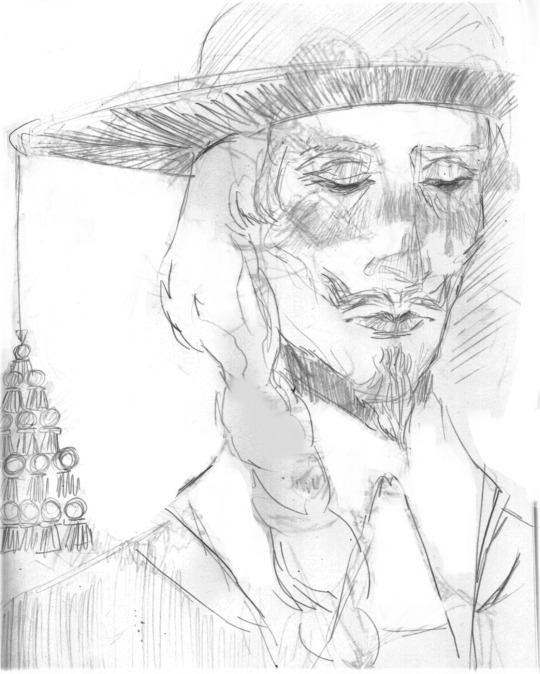
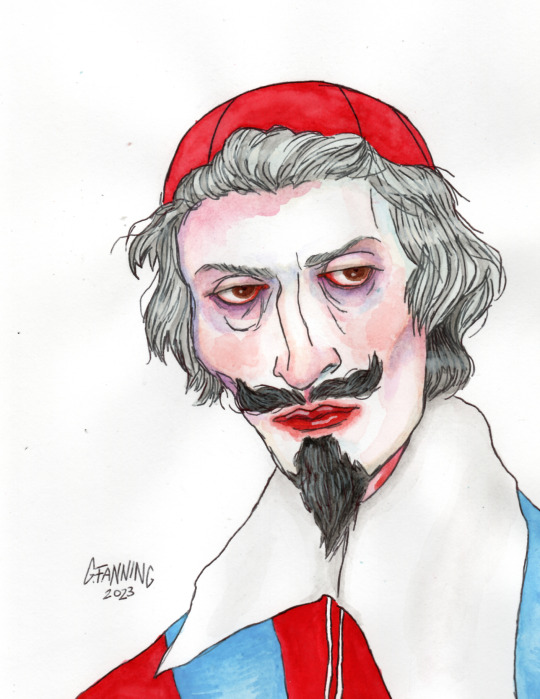
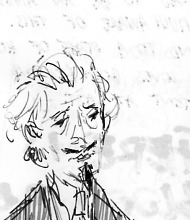
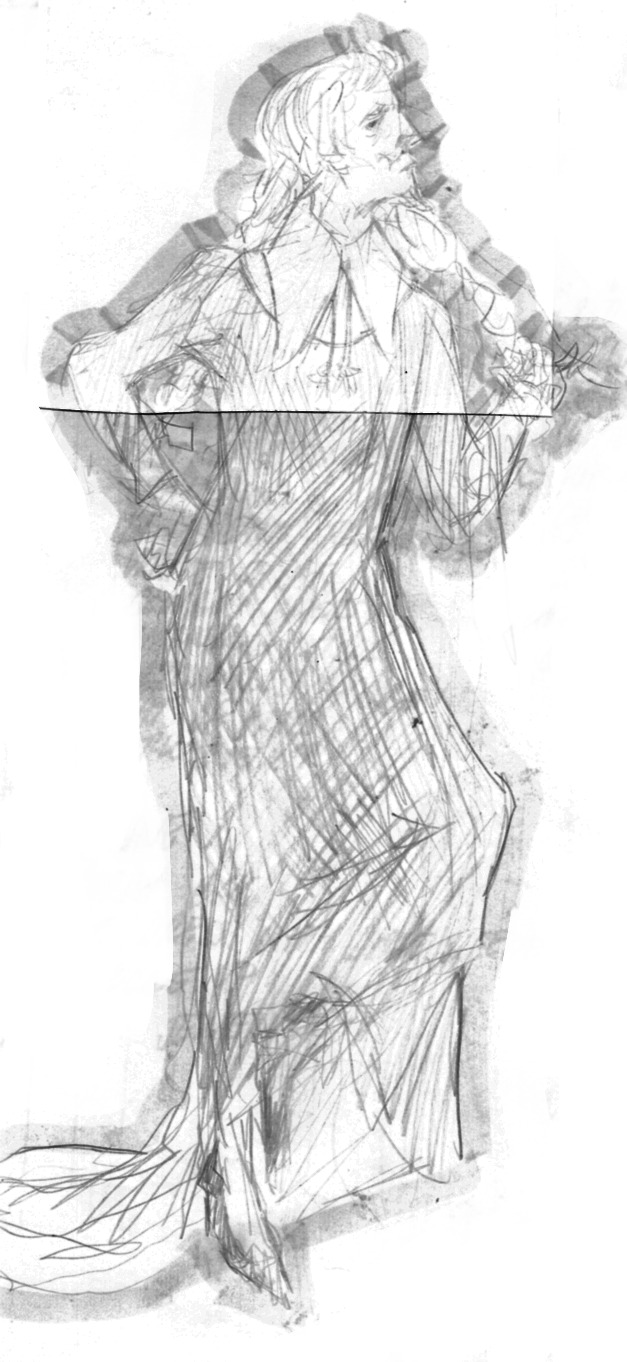
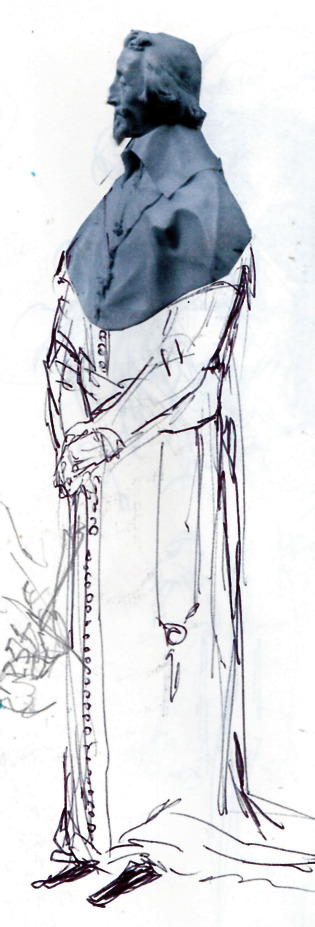
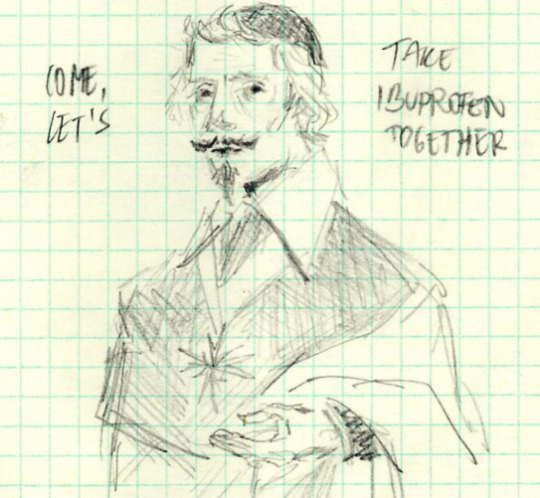
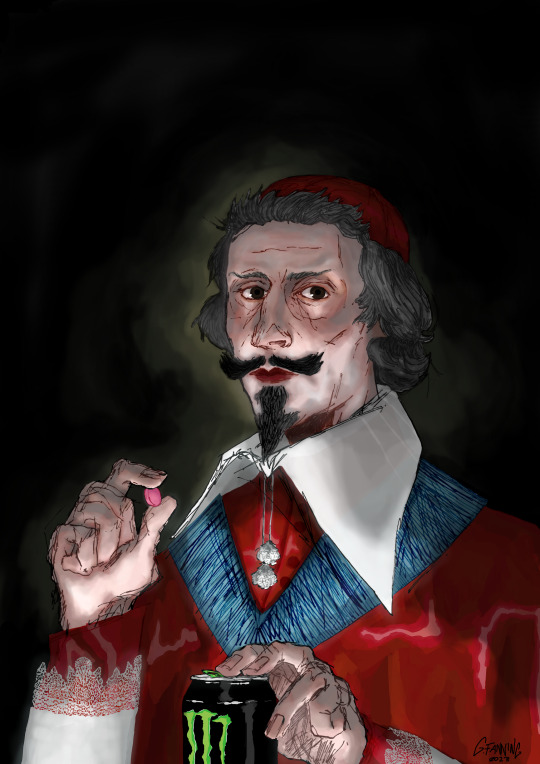
O' Cardinal! my Cardinal! our fearful trip is done, The ship has weather’d every rack, the prize we sought is won, The port is near, the bells I hear, the people all exulting, While follow eyes the steady keel, the vessel grim and daring; But O heart! heart! heart! O the bleeding drops of red, Where on the bed my Cardinal lies, Asleep cold and dead.
O' Cardinal! my Cardinal! rise up and hear the bells; Rise up—for you the flag is flung—for you the bugle trills, For you bouquets and ribbon’d wreaths—for you the shores a-crowding, For you they call, the swaying mass, their eager faces turning; Here Cardinal! dear flower! This arm beneath your head! It is some dream that on the bed, You’re asleep cold and dead.
My Cardinal does not answer, his lips are pale and still, My flower does not feel my arm, he has no pulse nor will, The ship is anchor’d safe and sound, its voyage closed and done, From fearful trip the victor ship comes in with object won; Exult o' shores, and ring o' bells! But I with mournful tread, Walk the chapel my Cardinal lies, Asleep cold and dead.
36 notes
·
View notes
Text

strategically placed fun post to distract from my little misstep
10 notes
·
View notes
Text


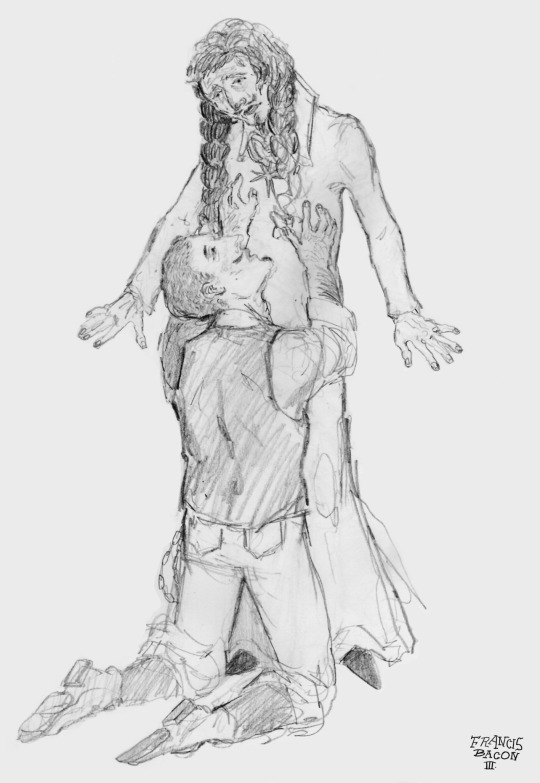


« comfort me with apples: for I am in need of love »
20 notes
·
View notes
Text

i loved @philippeducdanjou's post so much that i decided to make one of my own i'm sorry
#cardinal richelieu#louis xiii#fanningism#the three musketeers#artists on tumblr#traditional art#imitation is the sincerest form of flattery mediocrity can pay to greatness
30 notes
·
View notes
Text



i never finish anything these days and it breaks my heart. only rarely i feel a fraction of my former creative energy - the lack thereof exhausts me even more. i don't know where it has gone, why, or whether it will ever come back
10 notes
·
View notes
Text
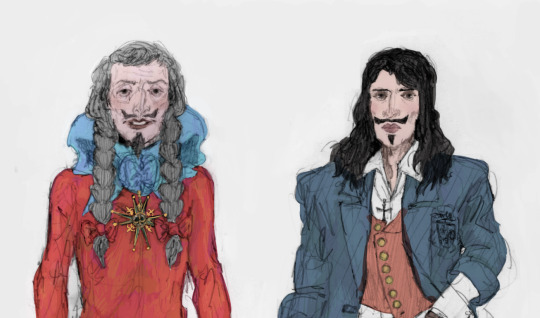
nouvelle saison de jojo a l'air super !
6 notes
·
View notes
Text

he's cute isn't he
10 notes
·
View notes
Text
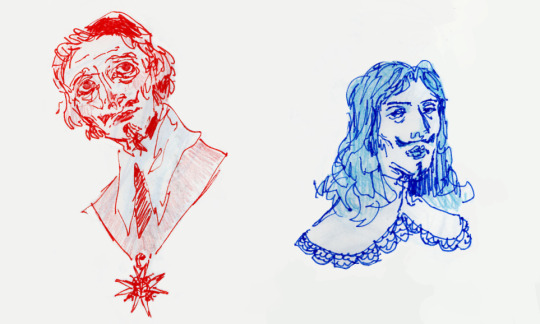


gaudeamus igitur
14 notes
·
View notes
Text

gravedigging
15 notes
·
View notes
Text
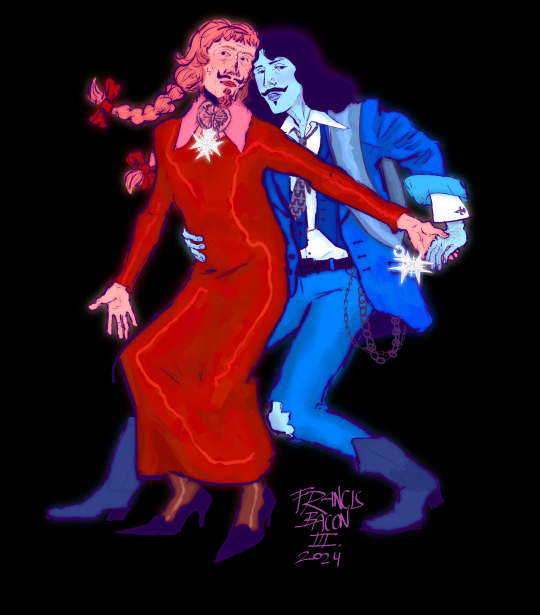
𝓱𝓸𝓽 & 𝓬𝓸𝓵𝓭
16 notes
·
View notes